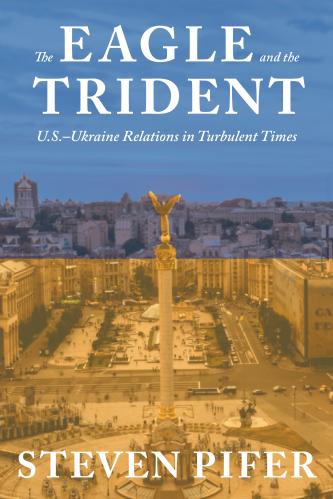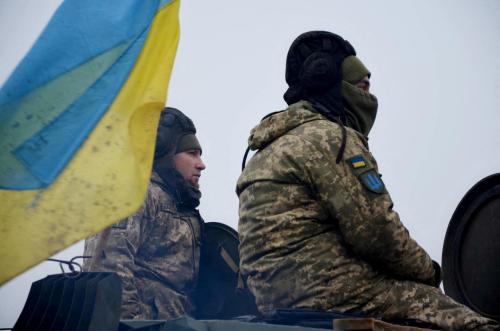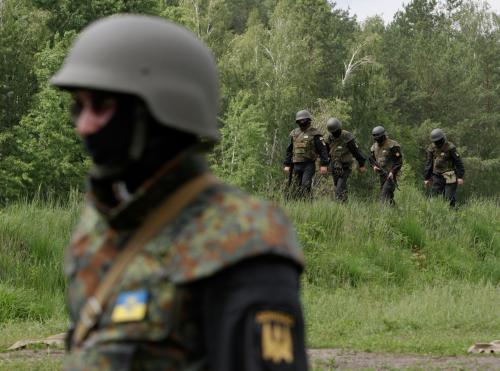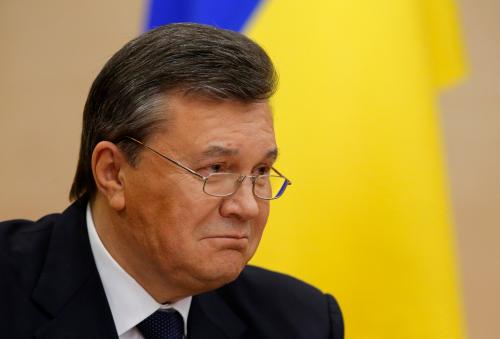Russian policy toward Ukraine is often puzzling, writes Steven Pifer, but now it is backfiring. Indeed, Vladimir Putin has succeeded where centuries of Ukrainian nationalists failed: He has created a strong sense of national identity—and he has imbued it with deep anti-Russian sentiment. This article first appeared in The Moscow Times.
Russian policy toward Ukraine is often puzzling. During a visit to Moscow nine years ago, I asked a retired senior Russian diplomat whether anyone in the Kremlin really understood Ukraine. One person did, he replied, but no one paid attention to him.
That might explain why Vladimir Putin’s policy is so badly backfiring.
Putin’s maladroit approach to Ukraine has been evident for years. On the margins of the April 2008 NATO summit in Bucharest, he told alliance leaders that Ukraine was not a real country. How did he expect Ukrainians to interpret that remark when it invariably leaked?
The Russian president last visited Kiev in July 2013, to commemorate the 1025th anniversary of Kyivan Rus’ conversion to Christianity. During the visit, he gave a speech in which he said that Ukrainians and Russians were one people. The remark went down poorly with a large number of Ukrainians, who heard those words as a denial of their culture, history, language, and very identity.
When I served at the U.S. Embassy in Kiev in the late 1990s, the number of Ukrainians harboring anti-Russian sentiment was a minority of the population. Most had positive views toward Russia or simply wanted to get along.
Not so today. Putin has succeeded where centuries of Ukrainian nationalists failed: he has created a strong sense of national identity—and he has imbued it with deep anti-Russian sentiment. After Russia’s seizure of Crimea and some 10,000 dead in Donbass, that is easily understood.
Opinion polls bear that out. An April 2017 survey conducted by the International Republican Institute, in partnership with Rating Group Ukraine, had 57 percent of respondents expressing a cold or very cold attitude toward Russia, as opposed to 17 percent who expressed a warm or very warm attitude.
Hostility toward Moscow manifests itself in other ways. More Ukrainians now make a point to use Ukrainian rather than Russian. Harkening back to Moscow’s claim to a special right to protect ethnic Russians and Russians speakers, wherever they might be and regardless of their citizenship, a joke on the streets in Kiev is, “I’m afraid of speaking Russian now, because Putin might want to protect me.”
As attitudes toward Russia harden, the leadership in Kiev has found itself with less room for maneuver. In summer 2014, Ukrainian President Petro Poroshenko hinted of a readiness to set aside any push to draw closer to NATO as part of an effort settle differences with Moscow. Now, he firmly embraces the goal of NATO membership, as unrealistic as that may be in the near term.
Mr. Putin’s conflict with Ukraine also reinforces an anti-Russian bias in the Ukrainian Parliament. Today, 423 of the chamber’s 450 seats are filled. The other 27 sit empty—awaiting elections for representatives from constituencies in Crimea and eastern Donbass, those parts of Ukraine illegally annexed by Moscow or occupied by Russian and Russian proxy forces.
Those are also areas that traditionally tended to vote for political parties more sympathetic to Moscow. The Opposition Bloc, successor to Victor Yanukovych’s Party of Regions, would have a significantly larger presence in the Rada if deputies were elected to occupy those 27 seats.
Most countries presumably desire stable, friendly, and positive relations with their neighbors. It will take years, if not decades, to restore positive feelings toward Russia among Ukrainians—and the reconciliation process cannot begin until Moscow makes major changes in its approach.
The past three years have strengthened the Ukrainians’ determination to solidify links to the West and to European institutions such as the European Union and NATO. They increasingly want nothing to do with Russia, though it remains a geographic fact that they cannot avoid.
It’s difficult to see how this advances Russian interests. It is time for Mr. Putin and the Kremlin to seek better advice on how to deal with their southeastern neighbor. Some suggest that the Russian president’s proposal for a peacekeeping operation is the opening bid in the Kremlin’s search for a way out of its Donbass quagmire.
If so, Mr. Putin should move more quickly. His current approach is locking in a generation of Ukrainians who will detest Russia.
The Brookings Institution is committed to quality, independence, and impact.
We are supported by a diverse array of funders. In line with our values and policies, each Brookings publication represents the sole views of its author(s).









Commentary
Mr. Putin: Turning neighbor into adversary
November 1, 2017